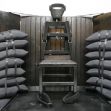A spiritual adviser to death row inmate Kenneth Eugene Smith has filed a lawsuit against the state of Alabama over plans to use nitrogen gas to execute the condemned prisoner.
The lawsuit was filed by Rev. Dr. Jeffrey Hood nearly a month before Smith is set to be executed On January 25th, 2024. Hood is a vocal advocate opposing the death penalty and works with the group Death Penalty Action. If the state goes through with the execution, it will be the first to use nitrogen gas to carry out a death penalty execution. Currently, Alabama is one of three states that have authorized nitrogen gas as an execution method. The two other states are Oklahoma and Mississippi.
The use of nitrogen gas became an option states entertained as a death penalty method after other methods resulted in botched executions. At the same time, drug manufacturers have refused to sell their products to state executioners, resulting in a limited availability of lethal injection drugs.
Nevertheless, nitrogen gas has met its fair share of criticism from inmate activist groups and other organizations who say it is an inhumane execution method. Death by nitrogen gas is designed to work by placing a mask over an inmate's face. Once the mask is secure, pure nitrogen gas will be released into the mask causing an individual to experience nitrogen hypoxia, and ultimately the inmate will suffocate to death.
Alabama authorities say that once the mask is placed over an inmate’s face, they will be able to breathe normally as they inhale the nitrogen gas. However, the inmate will then pass out because of a lack of oxygen and will die shortly thereafter.
Despite this plan of action, critics say that using nitrogen gas as a lethal execution method brings with it too much uncertainty. They highlight the potential dangers and obstacles that could present themselves when an inmate is exposed to the gas. Critics have also argued it's unknown whether the gas could harm the execution team, spiritual advisors and other witnesses.
In Hood’s lawsuit, he argues that this execution method "presents potentially significant dangers to his own life, and violates the religious liberties of both himself and Mr. Smith."
Alabama adopted the use of nitrogen gas as an execution method after it battled a string of botched executions. Since 2018, the state has experienced four executions that went awry.
Prisoner Kenneth Eugene Smith was one of the inmates who experienced a botched execution. Smith’s failed execution happened in November 2022. Days later, his legal team submitted a court filing in which he reported feeling a stabbing in his chest when prison staff tried unsuccessfully to insert a central line IV. After the failed execution, Smith's legal team asked that he not be executed with lethal injection. The state responded by implementing a plan that would use nitrogen gas instead.
The state's plan for using nitrogen gas goes into detail about protocols and safety measures that will be in place to ensure an effective execution. The plan does make note of potential dangers stating that “in the highly unlikely event that the hose supplying breathing gas to the mask were to detach, an area of free-flowing nitrogen gas could result, creating a small area of risk (approximately two (2) feet) from the outflow. Additionally, overpressure could result in a small area of nitrogen gas that displaces the oxygen in the area around the condemned inmate's face and/or head."
Hood takes issue with these potential dangers, explaining that his ability to provide spiritual guidance to Smith would be hindered because of the use of nitrogen gas. Hood references a 2022 Supreme Court ruling that required state officials to allow spiritual advisors to lay hands on and pray with inmates in the death chamber. However, the nitrogen gas method would require that Hood stay at least three feet away from Smith. Hood said that "the Supreme Court does not issue suggestions, it issues rulings," and that the state's decision to implement this execution method directly violates the Supreme Court's ruling.
Hood also takes issue with the state's interpretation of how nitrogen gas will be used. Hood references the changing roles and protocols saying that the state's approach felt like a “tyranny of vagueness.”
State officials have responded to Hood's allegations that the state is unprepared and unprofessional in its handling of executions. The Alabama Department of Corrections issued a statement that read in part, "The Alabama Department of Corrections (ADOC) denies any allegations that staff are unprepared for, or unprofessional during, the execution process. ADOC staff are trained for, and routinely practice, all aspects of their job responsibilities. Staff carry out court-ordered executions professionally and with due respect for the process and all individuals involved."






